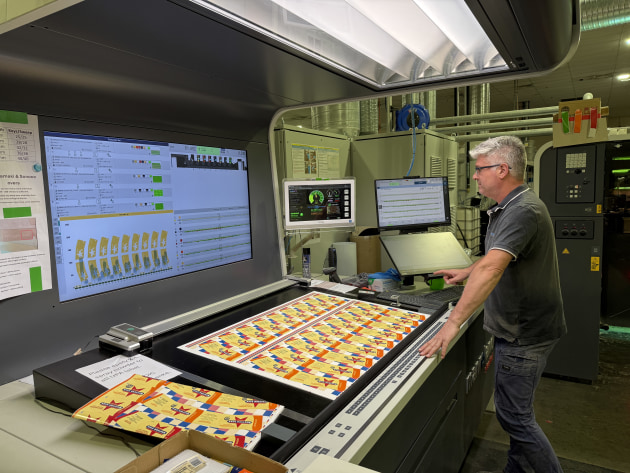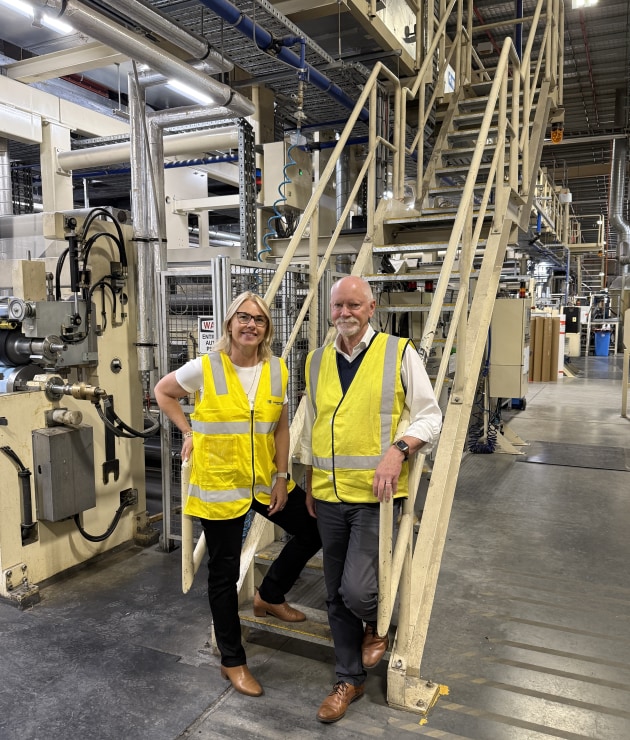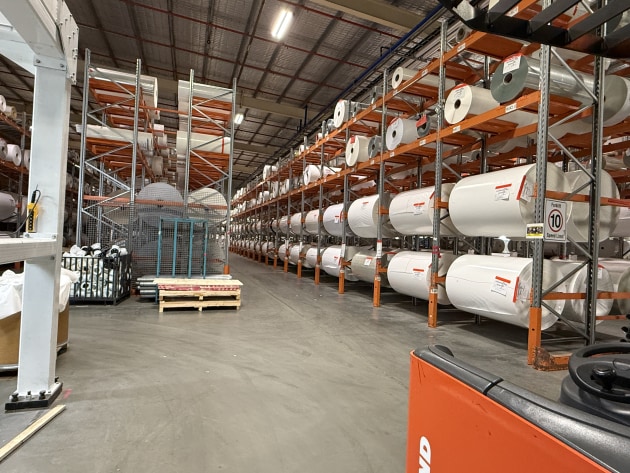A family-owned Australian business with a global outlook, Labelmakers is pushing the envelope in label manufacturing, not just through scale but through a tightly integrated model that spans in-house stock manufacture, advanced converting, and a bold sustainability agenda. Lindy Hughson reports.
During a recent tour of Labelmakers’ expansive converting and printing facility in Somerton, Victoria, I saw firsthand the impressive scale and technical depth that underpins its operations, brought to life at the hands of my expert tour guides, technical managers Graeme Lang and Dr Brant Maitland, and group environment & sustainability manager, Damian Smyth.

From paper to print
Unlike most label converters, Labelmakers manufactures its own pressure-sensitive label (PSL) stock, with the heart of this converting operation at the Somerton site. This centralised facility supplies sites in New South Wales, Western Australia, and New Zealand, and enables Labelmakers to trace material performance with precision.
“It gives us complete control over quality, materials, and specifications across every one of our sites,” says Graeme Lang.
“This facility was built on a bold commitment to invest in world-class engineering. When we installed our coater in 2006, it was state of the art – and in many ways, it still is,” Lang adds.
The process as explained to me is high tech yet straightforward: Jumbo reels of raw materials enter the facility and undergo a meticulous multi-stage process where a silicon-coated release liner, an adhesive layer, and a printable face stock are combined. Coating technologies can apply layers thinner than a micron – a feat requiring advanced engineering and electronic monitoring to ensure uniformity.
With a capacity to produce over 150 million square metres of PSL stock annually – approximately 40 per cent of Australia’s total label stock demand – Labelmakers’ strategic investments have clearly paid off.

Adhesives for a changing world
One of the most compelling insights from the tour was the company’s dedication to adhesives R&D – an area now driven as much by environmental considerations as by application performance.
“The biggest shift in the last five years has been around adhesives – getting good adhesion is one thing, but now we need to make sure they come off when processing the packaging for recycling. That’s a whole new design challenge,” explains Brant Maitland, technical manager of the coating division.”
Labelmakers has developed a suite of 25+ adhesive formulations, from ultra-permanent to easily removable. Increasingly, new development is focused on sustainability, with adhesives designed to be compatible with primary packaging materials for improved recyclability.
Of note is its work on UV acrylic adhesives, which combine UV resistance, clarity, water resistance, and clean removability. These adhesives outperform traditional formulations across extreme temperatures, enabling use in new sectors such as retort and sterilisation packaging.

Sustainable by design
Labelmakers’ waste recovery and recycling systems are embedded throughout its operations. Trim waste from converting lines, historically sent to landfill, is now redirected into closed-loop systems – including a project replacing single-use fibre cores with reusable plastic cores made from polymeric waste.
“We’ve been able to recycle matrix waste that used to go to landfill and turn it into reusable plastic cores – and now we’re pursuing a patent for that innovation,” Damian Smyth says.
The new B2B cores are designed for indefinite use, with brand partners participating in a returns program that promotes circularity while reducing waste.
In another example of circular innovation, Labelmakers has developed a proof-of-concept label made from 50 per cent post-consumer HDPE (from recycled milk bottles) and 49 per cent post-industrial HDPE.
“We’ve proven it’s possible to make a label out of a bottle… It’s expensive, but it proves the concept works.”
This proves the technical viability of bottle-to-label manufacturing. The next phase requires industry wide collaboration to better deploy packaging material through equivalent value recycling, rather than sending to landfill.
“The challenge now is getting the ink off in the recycling stream – that’s the final barrier to a true closed-loop label solution.”
Precision printing powered by investment
Labelmakers’ production floor features the full suite of printing assets covering digital, UV flexo, offset sheetfed to wide web solvent, with new multi-million-dollar presses added on an almost annual basis. Flexographic printing dominates large-scale jobs, while the more versatile digital printing comprises a smaller but rapidly growing segment. The company’s HP Indigo platforms, for instance, are used for promos with variable data and short-run campaigns; where digital print meets mass customisation.
“We invest in the latest technology – that’s how we stay ahead,” Lang says.
Smyth agrees, and adds, “We’re not just adding more machines – we’re adding faster, smarter, more technically advanced ones. Our footprint doesn’t need to grow substantially to grow our output.”
The company prints a wide range of packaging products – from pressure-sensitive substrates, wrap-around labels, shrink sleeves, cut & stack labels, folding cartons, flexible packaging, blister foil and in-mould labels – servicing major brands such as Coca-Cola, Asahi Beverages, Coles, and Swisse.
Labelmakers’ new carton division in Victoria adds another layer to the company’s integrated packaging offer. Flat carton board sheets are printed, die-cut, glued, and shipped to customers alongside their corresponding labels – providing end-to-end packaging solutions with reduced freight emissions and lead times.

Building for the future
With a team exceeding 600 across Australia and New Zealand, Labelmakers credits much of its success to a flat management structure and a culture of rapid decision-making.
“It’s still a big family business, with a flat structure. If an investment makes sense, it happens fast – no red tape,” Lang says.
Operators on the factory floor are trained in advanced quality processes and methods.
“We don’t just train our operators to run machines – we train them to ask why. Our team monitors peel adhesion, creep, tack, static and a whole suite of different variables to manage quality on the floor,” Maitland adds.
The business is aligned with APCO’s goals and evolving packaging legislation, including preparation for the proposed introduction of Extended Producer Responsibility (EPR) in 2027. By developing recyclable formats and proactively offering customers options like de-bondable labels and labels containing recycled content, Labelmakers is ready to meet future regulatory and market demands.
“We’re working closely with brand owners and recyclers to align adhesives and facestocks with applications and substrates to ensure better recyclability,” Smyth says.
As the tour concluded, it became clear that Labelmakers is not just a label printer – it is a vertically integrated, sustainability-driven operation that continues to evolve in anticipation of what’s next. In an industry where adaptability and innovation are critical, Labelmakers stands out not just for what it makes, but for how it thinks.






